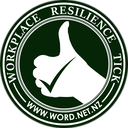WelcomeKia ora everyone, and welcome to the Workplace Resilience corner of AWAWS – a place dedicated to discussion and information about keeping us safe, healthy and in control of our work and study environments.
The following pages are assembled from current public knowledge, together with specialist research around workplace bullying. References can be found at the end of the document and there are other useful links throughout. We will talk about 5 main topics around bullying, and provide resources for further information:
Did you know?Workplace bullying is often approached under the umbrella of ‘cultural change,’ but specific training in coping with it is relatively rare. For example, we may be advised on what might constitute bullying, and encouraged to ‘speak up,’ but often without advice to help us with this potentially risky task. This is where personal development comes in, which we begin here. |
An important note:
|
Advice contained in these pages does not replace any employer / institution policy or procedure around making a bullying complaint. These resources are instead aimed to build your understanding of the bullying phenomenon and offer a framework under which to manage acute workplace bullying situations – to know how to help, when you can.
Do feel free to dip into links in this document, but remember that specific or personal issues (about someone else’s behaviour, or your own), may still be taken to the available support people in your workplace. You are also welcome to get in touch with [email protected] – all inquiries are in strict confidence. Before we begin, it is important to understand what we mean by bullying, and get some ideas about its causes. |
Bullying Aetiology
|
We know many bullying incidents are simply the result of bad behaviour.
Did you know that bullying can also be caused by stress? This is especially the case in workplaces involving a heavy workload, significant risk, life or death situations and where staff have a lack of control, such as where they are micro managed. Stressors can also take the form of financial worries, pressure to perform and issues at home. If you, or your staff work in such conditions, or have wellbeing concerns, these issues are worth bearing in mind to control behaviours at a foundational level. This is especially the case during this time that Covid-19 has added extra burdens to us all. Bullying can also occur (i.e. be felt to be bullying) where differing cultural behaviours intersect (e.g. where senses of humour differ). Bullying can also result from a skill deficit (e.g. in teaching or communication) and some people who have been bullied in the past might adopt this behaviour – bullying can be learned and inherited. Because investigative processes can be challenging, involve a substantial stigma and create a lot of drama, bullying complaints can also can be made in retribution - perhaps as a way to ‘get someone back’ or scupper a rival’s chances of promotion. The field of bullying is therefore complex and it would be impossible to include advice and information about all permutations here. We provide these pages with some of the more common issues in mind, to help your practice and hopefully pique your interest in proactive ways to approach such behaviours. If you would like advice for a specific workplace, feel free to get in touch – recent research indicates that many bullying incidents can be bypassed by the use of a relatively simple framework for ensuring staff have all their needs met in the workplace. |
Values
|
In academia (and many other workplaces), values issues can be at the root of bullying behaviours. These subconscious or conscious belief systems can differ greatly between people and are usually a combination of ‘inherited’ values (familial, cultural) and those created from a collection of life experiences (e.g. learning experiences).
Because values are at the very ‘soul’ of who we are, incidents which implicate them can quickly escalate into conflict situations, commonly based on a defensive reaction of the people involved. This understanding is at the heart of much advice offered here, and is the subject of important ongoing research. It is important that we take potential values issues into account when handling bullying incidents, because failing to do so can exacerbate the situation for all concerned. |
Definition of Bullying
|
There is currently a lack of consensus on a definition of bullying in the workplace. In recent research, the following has been used because of its explicit inclusion of the learner:
Mistreatment, either intentional or unintentional occurs when behaviour shows disrespect for the dignity of others and unreasonably interferes with the learning process. Examples of mistreatment include sexual harassment; discrimination or harassment based on race, religion, ethnicity, gender, or sexual orientation; humiliation; psychological or physical punishment; and the use of grading and other forms of assessment in a punitive manner." What is and isn't bullying?To begin, we also need a sense of what bullying is, and isn’t. Feel free to chat these examples over with your colleagues, and think of your own. This is a good way to extend one’s understanding of workplace behaviours.
|
Follow the links to find out more about:
For comments or suggestions on the material presented here, please contact [email protected]

